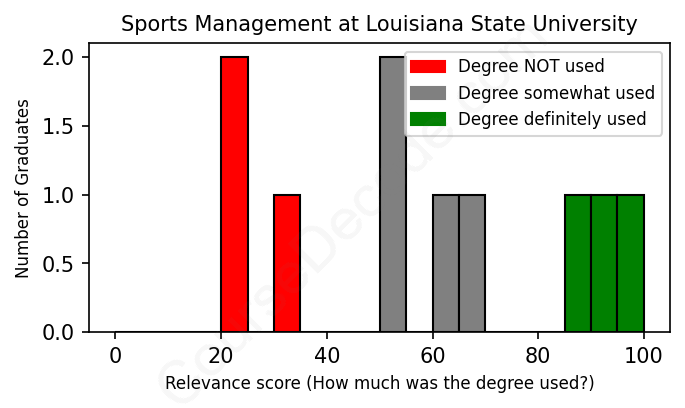
First, some facts. Of the Sports Management graduates from Louisiana State University we've analyzed , here's how many have used (or NOT used) their degree in their career:

These are estimates based on AI analysis of 10 LinkedIn profiles (see below).
The verdict? Below average. Overall, with an average relevance score of 58%, Sports Management graduates from Louisiana State University have a lower likelihood (-9%) of finding work in this field compared to the average graduate across all fields:
And for comparison, here's the chart for all profiles we've looked at across all degrees.
Also, after graduating, only 30% of these graduates have pursued further education other than another Bachelor's degree (such as a Masters degree or other), compared to the average across all profiles of 35%. This suggests a Bachelors degree is enough for most Sports Management graduates, and it's normal to look for work straight after graduation.
See the details:
|
Relevance score: 86% We think this person has gone into a career highly relevant to their degree. We think this person has gone into a career highly relevant to their degree.
DEGREE INFOGraduated in 2014 from Louisiana State University with a Bachelor of Science - BS in Sports Management. No other secondary education since. JOB HISTORY SINCE GRADUATIONAmericorps Member Project Transformation - North Texas May 2014 - Aug 2014 Americorps Member  Project Transformation - North Texas May 2015 - Aug 2015 Americorps Member  Project Transformation - North Texas Aug 2015 - Aug 2016 Coach  Soccer Shots Franchising Dec 2016 - May 2017 Young Adult Development Director  Project Transformation Rio Texas Sep 2019 - Mar 2023 Outreach Program Coordinator  GeoFORCE Texas Feb 2023 - Present ABOUTNo information provided. |
The top 10 most common jobs done by the graduates we've analyzed (ranked most common to least) are:
From my analysis of LinkedIn profiles, it's clear that graduates with a degree in Sports Management from Louisiana State University have taken on various jobs across the sports industry and beyond. A common theme among these roles includes positions in sales and customer relations, like the Sales Associate and the Premium Seating Concierge, which directly align with sports management principles. Many individuals also found roles as coaches or in operations within sports organizations, demonstrating a direct application of the skills gained through their degrees. However, there are also several examples of jobs that don't seem to connect much to sports management, like those in retail management, personal training, or even window cleaning. While such roles might utilize general soft skills relevant to business, they diverge significantly from the specialized knowledge and focus of a Sports Management degree.
Overall, while many of these jobs demonstrate relevance to the field of Sports Management, there are a fair number of positions that veer off the path. Students seem to be using their degrees to either find jobs firmly rooted in sports or branching out into roles that don’t fully capitalize on their specialized training. Thus, it’s a mixed bag of experiences, with some graduates thriving in relevant sports positions, while others find themselves in roles that, while utilizing some skills, lack the depth of knowledge required in the sports management arena. This suggests that while a degree in Sports Management can open doors, the path taken by graduates can vary widely based on personal interests and opportunities available after graduation.
Here is a visual representation of the most common words in job titles for Sports Management graduates (this is across all Sports Management graduates we've analyzed, not just those who went to Louisiana State University):

Looking at the career trajectories of graduates from Louisiana State University's Sports Management program, it seems like many of them start out in roles that may not be directly related to a traditional sports management career but still have relevant elements. For instance, early roles like sales internships, retail management, and various associate positions show that graduates are often getting their foot in the door through entry-level positions that help build essential skills. It does appear that some graduates also jump straight into administrative or operational roles within sports organizations, which is pretty promising for starting off in the field.
Fast forward five to ten years later, and there's a mix of success paths. Some graduates have landed roles like Assistant Vice President or Business Development Managers, showing that they’ve made significant strides in their careers. However, others are in roles that seem a bit distant from the sports management niche, such as retail and general business development positions. While a chunk of graduates manages to steer their careers back towards the sports industry, there’s also a fair number who are taking broader career paths outside of sports. Overall, it looks like LSU's Sports Management program offers a decent starting point, but the directions people take can vary widely, with some seeing great success and others perhaps settling for jobs that don’t leverage their specific degree.
Honestly, a Bachelor’s degree in Sports Management at Louisiana State University or anywhere else can be pretty manageable if you’ve got a genuine interest in sports and are willing to put in the effort. While some of the classes might challenge you a bit—like the ones covering marketing or finance—most students find the material engaging and relatable since it ties into the world of sports. Group projects and hands-on experiences often make it more enjoyable, so it doesn’t feel like traditional, boring coursework. Overall, it’s about average in terms of difficulty, especially if you’re passionate about the field; just stay organized, keep up with the assignments, and you should be fine!
Most commonly, in the LinkedIn profiles we've looked at, it takes people 4 years to finish a Bachelor degree in Sports Management.
Looking at the jobs these Sports Management grads from LSU have landed, it seems like they’ve had a mixed bag when it comes to making decent money. The graduate from 2013, who’s now an Assistant Vice President, definitely seems to be doing well in terms of salary, but others, especially those just starting out or in more entry-level positions like the Americorps roles and the intern jobs, might not be bringing in big bucks yet. The newer grads from 2023 are still at the very beginning of their careers, so they'll have to wait and see where they'll end up financially. Overall, if you’re in sports management, it looks like the possibilities are there, but it can take some time and experience to really start seeing the paycheck you might hope for!
Here is a visual representation of the most common words seen in the "about" section of LinkedIn profiles who have a Bachelor degree in Sports Management (this is across all Sports Management graduates we've analyzed, not just those who went to Louisiana State University). This may or may not be useful:

Here are all colleges offering a Bachelor degree in Sports Management (ordered by the average relevance score of their Sports Management graduates, best to worst) where we have analyzed at least 10 of their graduates: